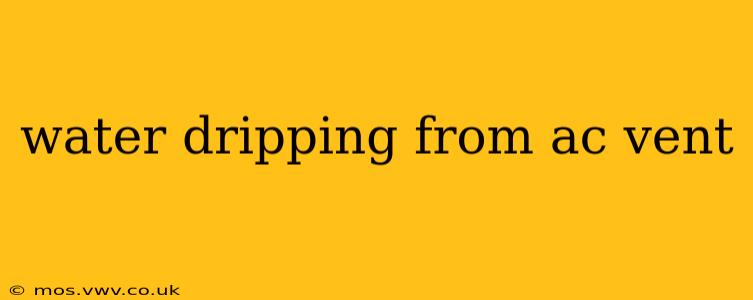Water dripping from your air conditioning vent is never a pleasant surprise. It can lead to water damage, mold growth, and a host of other problems. Understanding why this is happening is the first step to fixing it. This comprehensive guide will explore the common causes of AC vent dripping, offering practical solutions and preventative measures.
Why is Water Dripping from My AC Vent?
This is often the first question homeowners ask. Several factors can contribute to water dripping from your air conditioning vent, and pinpointing the exact cause is crucial for effective remediation. Let's explore the most common culprits:
Clogged Condensate Drain Line:
This is by far the most frequent reason for water dripping from an AC vent. Your air conditioner produces condensation as it cools the air. This condensate normally drains away through a condensate drain line. If this line becomes clogged with dirt, algae, or other debris, the water backs up and overflows, leading to drips from your vents.
Frozen Evaporator Coil:
A frozen evaporator coil restricts airflow, preventing proper drainage of condensation. This typically occurs due to:
- Restricted Airflow: Dirty air filters, clogged vents, or obstructions around the unit can restrict airflow, causing the evaporator coil to freeze.
- Low Refrigerant: Insufficient refrigerant reduces the coil's ability to absorb heat, leading to freezing.
- Faulty Blower Motor: A malfunctioning blower motor may not circulate enough air, resulting in freezing.
Leaking AC Unit:
Sometimes, the problem isn't with the drainage system itself, but with the air conditioner unit itself. Leaks within the unit can cause water to drip from the vents. This might be due to a crack in the unit or a malfunctioning component.
Improper Installation:
Incorrect installation of the air conditioning system can lead to drainage issues. If the unit wasn't installed at the correct angle, or if the condensate drain line wasn't properly connected, water could overflow and drip from vents.
How to Fix Water Dripping from Your AC Vent
Addressing the dripping water requires careful diagnosis and appropriate action. Here's a step-by-step approach:
1. Check the Condensate Drain Line:
Locate the condensate drain line (usually a PVC pipe) and check for clogs. You can often clear minor clogs by using a wet/dry vacuum or a plumbing snake. For stubborn clogs, you might need to flush the line with a drain cleaner specifically designed for this purpose. Never use harsh chemical drain cleaners as these can damage the drain line and other components.
2. Inspect the Evaporator Coil:
Access the evaporator coil (usually located inside the air handler) and check for ice. If it's frozen, turn off the AC unit and allow it to thaw completely. Once thawed, inspect the air filter, vents, and the area around the unit for obstructions restricting airflow. If the problem persists, you may need to call an HVAC professional to check the refrigerant levels and blower motor.
3. Examine the AC Unit for Leaks:
Carefully inspect the entire AC unit, looking for any visible leaks or signs of damage. If you find a leak, you'll likely need to call an HVAC technician to repair or replace the damaged component.
4. Consider Professional Help:
If you're unable to identify or fix the problem yourself, it's crucial to contact a qualified HVAC technician. Attempting complex repairs without the proper knowledge and tools can worsen the problem and potentially damage your air conditioning system.
Preventative Measures to Avoid AC Vent Dripping
Regular maintenance is key to preventing water dripping from your AC vents. Here are some preventative measures:
- Regularly Change Air Filters: Changing your air filters every 1-3 months (depending on usage and filter type) prevents restricted airflow and keeps the evaporator coil from freezing.
- Schedule Annual AC Maintenance: Professional maintenance checks the entire system, including the condensate drain line, and addresses potential issues before they escalate.
- Keep the Area Around the Unit Clear: Ensure there's adequate space around the outdoor and indoor units for proper airflow.
- Inspect the Drain Line Periodically: Regularly check the condensate drain line for clogs or blockages.
By understanding the causes of water dripping from your AC vent and taking proactive steps, you can ensure the smooth and efficient operation of your air conditioning system and avoid costly repairs or damage to your property. Remember, if you're unsure about any aspect of the repair process, it's always best to seek professional help.
